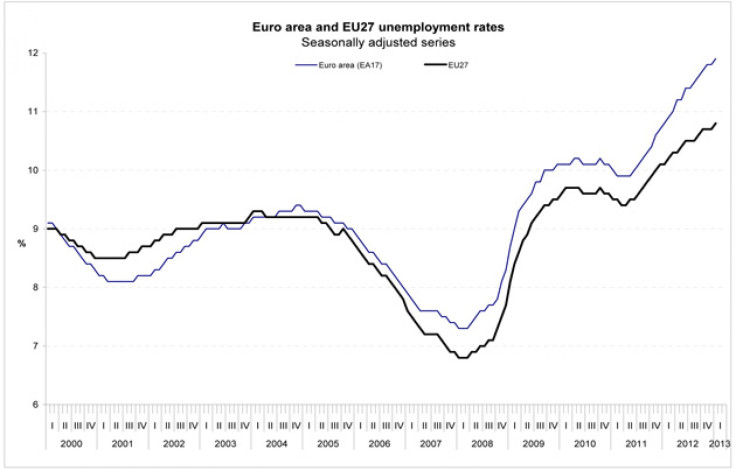January 2013 European Unemployment: It's Bad, And Getting Worse, Especially For Young People

Not only is there no end in sight for Europe’s unemployment blues, joblessness is getting worse, and the most severely affected are young people. In response, European Union leaders announced Friday a massive initiative to remedy the plight.
In January, 26 million people in Europe’s 27 states were out of work, the European Commission's Eurostat agency said. That’s a 10.8 percent rate, up considerably from the 10.1 percent seen the previous January. Nineteen million of these people reside in the 17 euro zone states that saw year-over-year January joblessness rise to 11.9 percent from 10.8 percent.
Austria, Germany, Luxembourg and the Netherlands have the lowest single-digit rates, while Greece and Spain are reeling with unemployment rates above 25 percent.
But the big story is the youth unemployment.
In Greece, nearly 60 percent of working-age people under 25 sit idle. Spain’s youth jobless rate is also at a disturbingly high 55.5 percent, while Italy’s rate hovers at 38.7 percent. Nearly one in four working-age young euro zone residents is out of work. Germany’s rate is lowest, at 7.9 percent.
The situation is so dire in many European nations that regional labor ministers warned this week in Brussels that something needs to be done lest joblessness among young people threaten the European Union itself.
Could young, angry jobless Europeans living under what could become years of economic austerity, especially in Southern Europe, grow into a movement that would disintegrate regional unity?
"The rising social costs and high unemployment -- particularly youth unemployment -- may undermine people's trust in the value of the European community and its institutions," said a statement from European labor ministers ahead of a meeting in Brussels on Thursday, according to Reuters.
“Too many young Europeans are asking if they will ever find a job or have the same quality of life as their parents," said European Commission President Jose Manuel Barroso on a visit to Dublin Thursday, according to the Belfast Telegraph. "They need answers from us. That is why, for the past two years, the European Commission pushed the urgent need to tackle youth unemployment to the top of Europe's political agenda."
On Friday, the ministers announced from Brussels that countries agreed to adopt a €6 billion ($7.87 billion), six-year program similar to ones implemented in Austria and Finland that offers youths internships, training programs or new education within the first four months of obtaining a degree in countries facing more than 25 percent youth unemployment, reported the Mediterranean region news agency ANSAmed.
© Copyright IBTimes 2024. All rights reserved.












